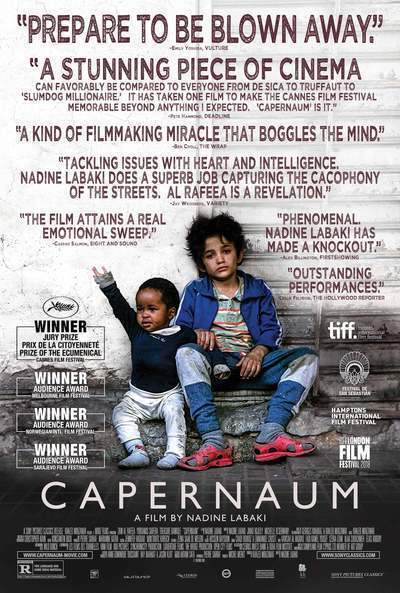“Boy Longs for Love and Justice in a Fallen World”

| None | Light | Moderate | Heavy | |
|---|---|---|---|---|
| Language | ||||
| Violence | ||||
| Sex | ||||
| Nudity |
What You Need To Know:
CAPERNAUM features flawless performances as well as an ethereal musical score that flows seamlessly with the on-screen action. Too many flashbacks interrupt the story’s narrative flow too much, but the story is still engrossing and moving. CAPERNAUM features some Christian, biblical elements and a happy ending. However, CAPERNAUM contains heavy foul language, brief nudity and other immoral behavior requiring extreme caution, including dysfunctional family relationships and selling drugs. The movie’s title is a reference to Jesus condemning the city of Capernaum in Matthew 11. MOVIEGUIDE® advises extreme caution for CAPERNAUM.
Content:
Light Christian, redemptive worldview with some moral, biblical elements including movie’s title is a reference to Jesus condemning the city of Capernaum in Matthew 11, main character expects his parents to love, care, and provide for him and his siblings although they fall far short of that, and Coptic Christians are shown visiting prisoners, mitigated by strong immoral pagan behavior as many characters showcase evil intentions and treat others with disrespect and other characters also make poor decisions, some Romantic hints and complaints that society is to blame for people’s shortcomings, plus some false religion when prisoners perform an Islamic call to prayer in captivity, and woman says, “I am my own judge,” and “When God takes something away from you, he blesses you”;
54 obscenities (including 14 “f” words), two GD profanities, depicted urinating, depicted breastfeeding;
Group of male children play with pretend guns and roam the streets breaking glass window, parents smack their children to get them to change their behavior, young male character attacks his brother-in-law with a kitchen knife although scene is not shown, in the next sequence the brother in law appears in a wheelchair from being stabbed;
Strong sexual immorality occurs when there are conversations about a young adult male pedophile having intercourse with his 11-year-old “wife,” who gets pregnant and then hemorrhages to death, plus light sexual content such as allusion to a married couple having sexual relations next to their children behind a sheet (due to lack of personal space), preteen female character starts her menstrual cycle and talks about it with her brother, prostitutes arrested, and young boy exposes breasts of a statue; •
Female character’s breast shown as she tries to rid her body of breastmilk, brief upper male nudity, young character shown in his underwear, and male children seen bathing, but their private parts are covered;
Alcohol depicted; •
Smoking depicted, toddler seen innocently playing with a cigarette, parents and their children smuggle drugs for money, 12-year-old boy makes and sells drugs to provide food for himself and a younger child;
Very strong miscellaneous immorality, such as poor role models, lots of name calling, dysfunctional family portrayals, kidnapping, lying, stealing, selfishness.
More Detail:
The first shot shows Zain looking sad in his underwear as he stands in a jail cell. The camera abruptly transitions to establishing shots of Zain and other male children playing in an abandoned building. Zain then appears in a courtroom telling a judge he wants to sue his parents for “being born.”
Cut to a flashback of Zain and his family before his arrest on some unknown charge. Zain’s parents are drug dealers while Zain works various jobs on the street to help keep the family afloat. He has a special bond with his 11-year-old sister, Sahar. Sahar begins her menstrual cycle, and Zain is afraid that, if their parents find out, she’ll get “married” to 25-year-old man named Assad who fancies her. To Zain’s regret, this is exactly what happens. So, Zain runs away from his home out of anger, believing his parents truly don’t care for their children’s wellbeing.
Cut to the courtroom again, where Zain’s father appears in the courtroom and gives a monologue detailing his remorse at previous events and wishing he’d never become a father. He says everyone told him it was the only way to become a “true man.”
Flashback to Zain running away from home. He travels via bus to find work and spends many days on the street looking for money, shelter and companionship. While at a run-down fair, he meets Rahil, an illegal Ethiopian immigrant who’s hiding her infant son, Yonas, while working in the country. Rahil allows him to stay with her and Yonas while she works and tries to find funds to make her residency legal. Rahil resorts to prostitution to send money back to her mother in Ethiopia and provide for her son. However, one day while Zain’s babysitting, she doesn’t come home.
Zain becomes Yonas’ primary caretaker, taking him along to find work and food. Zain refers to Yonas as his brother. As a result, Zain receives many questions about their different skin color, but he chalks it up to “too much coffee while pregnant” and other silly things that no one questions.
In desperation to get out of the country and improve the quality of their lives, Zain makes and sells drugs for a period until he seeks out a neighborhood “know-all guy” named Asporo. Asporo promises that, if he gives him Yonas, he’ll see to it that the child has a great life with a new family. Zain reluctantly agrees and has a touching parting with Yonas on the street.
To reach his goal of getting out of the country a reality, Zain goes back to his family’s house to look for any legal documentation of his existence. While there, he learns that his sister, Sahar, has died. Assuming it had something to do with her older husband, Zain takes a kitchen knife and storms out the door with his parents frantically following him and cursing him.
Flash forward to the courtroom where viewers learn that Sahar died because of hemorrhaging from a pregnancy. The movie also reveals that Sahar’s “husband” had survived Zain’s knife attack, but he gives testimony in a wheelchair. Zain’s mother, like his father in earlier scenes, is in tears crying over the situation. She acts as though no one could possibly understand what she’s been going through in her life. “I am my own judge,” she says.
As Zain goes about his life in prison, Rahil hears his name aloud and in distress yells about her son, Yonas, since Zain isn’t with him. Where could he be? Zain meets with his mother for a scheduled meeting, and she tells him, “When God takes something away from you, he blesses you.” She’s pregnant and plans to name the baby Sahar in memory of her late daughter. Zain’s emotions cry out for justice as he tells her, “You have no heart.”
Zain calls into a TV program and relays his story and his desire to sue his parents to listeners. The publicity gives police officials cause to check up on Yonas.
Will the police find Yonas? Will Rahil be released from prison and reunited with her son? What kind of sentence will Zain get for his knife attack on his dead sister’s husband.
CAPERNAUM is a sobering, moving story that depicts the hardship of maltreatment, loss and poor life choices while trying to find a better life. CAPERNAUM features flawless performances by all the actors as well as an ethereal musical score that flows seamlessly with the on-screen action. The flashbacks hurt the movie’s flow but are otherwise done well. So, they shouldn’t deter viewers totally from connecting to the story and characters.
CAPERNAUM has a light Christian, redemptive worldview with some moral, biblical elements. In addition to the movie’s reference to Jesus and Matthew 11, Zain expects his parents to love, care and provide for him and his siblings, although they clearly fall far short of that standard. Also, despite the story’s tough, tragic elements, CAPERNAUM ends on a hopeful note.
That said, many characters in Capernaum display evil intentions and treat others with disrespect. Other characters also make poor decisions, such as when the Ethiopian mother decides to prostitute herself, or when Zain decides to sell drugs like his parents and attack his dead sister’s pedophile husband. In one scene, Coptic Christians are shown visiting prisoners in the jail, but in another scene some prisoners perform an Islamic call to prayer. Finally, in addition to the movie’s drug references, CAPERNAUM contains heavy foul language, brief nudity and, of course, dysfunctional parents who make their children help then make drugs and make their young daughter become a man’s child bride. MOVIEGUIDE® advises extreme caution for CAPERNAUM.
“Then Jesus began to denounce the towns in which most of his miracles had been performed, because they did not repent. . . . ‘And you, Capernaum, will you be lifted to the heavens? No, you will go down to Hades. For if the miracles that were performed in you had been performed in Sodom, it would have remained to this day. But I tell you that it will be more bearable for Sodom on the day of judgment than for you.’”
– Matthew 11:20, 23-24.


 - Content:
- Content: 




